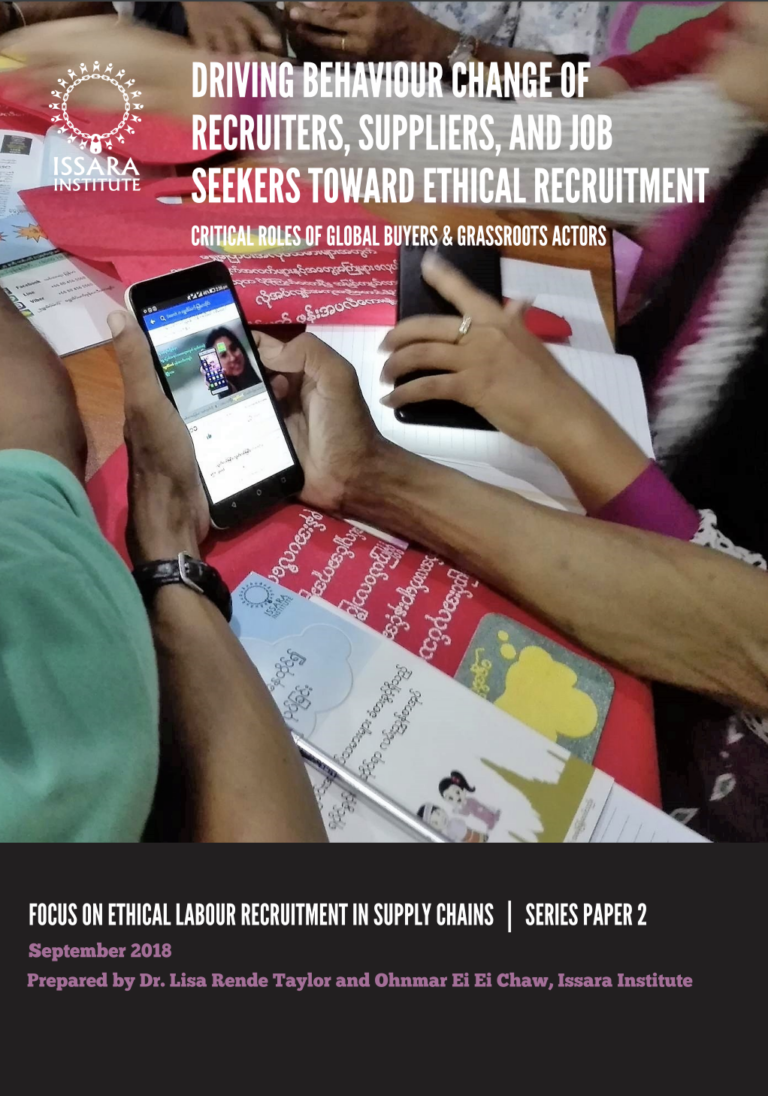This report was prepared by Dr. Lisa Rende Taylor and Ohnmar Ei Ei Chaw, Issara Institute.
Issara Institute programming in Myanmar and Thailand over the past year has focused on driving more ethical recruitment systems, down to the ‘first mile’ where risk of job seekers falling into debt is high. Ethical recruitment systems feature the majority of costs (all fees related to the recruitment process) borne by the employer, rather than job seekers paying agents, recruitment agencies and bearing other fees. Eliminating first-mile debt is key to zero-fees recruitment as well as to eliminating risks at destination that are linked to indebtedness, such as restrictions on freedom of movement, excessive wage deductions and underpayment, and discrimination. In the origin country of Myanmar, Issara piloted partnering with a network of civil society organizations and progressive recruitment agencies to displace middlemen brokers. Issara also created a range of digital resources such as the Golden Dreams smartphone application, which directly connects job seekers to progressive recruitment agencies, provides a wealth of know-your-rights information, and offers varied communications channels for workers to verify and report the conditions of their recruitment. Strategies in the destination country of Thailand centered on professionalizing and transforming the labour recruitment practices of Thai suppliers in the supply chains of Issara Strategic Partners (global brand, retailer, and importer companies), where supply chain leverage and responsible sourcing encouragement from Issara Strategic Partners has been crucial given the fact that labour recruitment in Thailand has generally been low-to-no fees paid by the employer, rather than low-to-no fees paid by the worker.
Key findings based on preliminary impact assessment during the first year of Issara’s ethical recruitment program strongly suggests that efforts in the origin country to identify and eliminate upstream debt are highly effective, since job seeker trust of CSOs and use of digital technologies is high, and Burmese recruitment agencies seem generally open to more ethical recruitment business models where employers pay the costs of recruitment rather than workers. However, most Thai employers and their agents continue to lack transparency in their recruitment process and fee structure and there is widespread practice of Thai agents forcing Burmese recruitment agencies to “pay to play” (informal fees that are external to stated recruitment costs just for the opportunity to place workers with their representative employer). This underscores the importance of the employer directly engaging with the origin-side recruitment agency and having a transparent service agreement (ideally long-term) between the two. Considerably more global buyer power is needed to enable and/or push Thai businesses to shift from profiting from labour recruitment (paying below true market rates due to workers bearing the brunt of costs) to paying for all costs of labour recruitment. Isolated cases of employer-pays ethical recruitment as verified by worker voice exists within Issara supply chains, but they are mainly due to the strong efforts of a few global buyers that incentivize and stand behind suppliers who are willing and able to adopt transparency and pay for labour recruitment.

